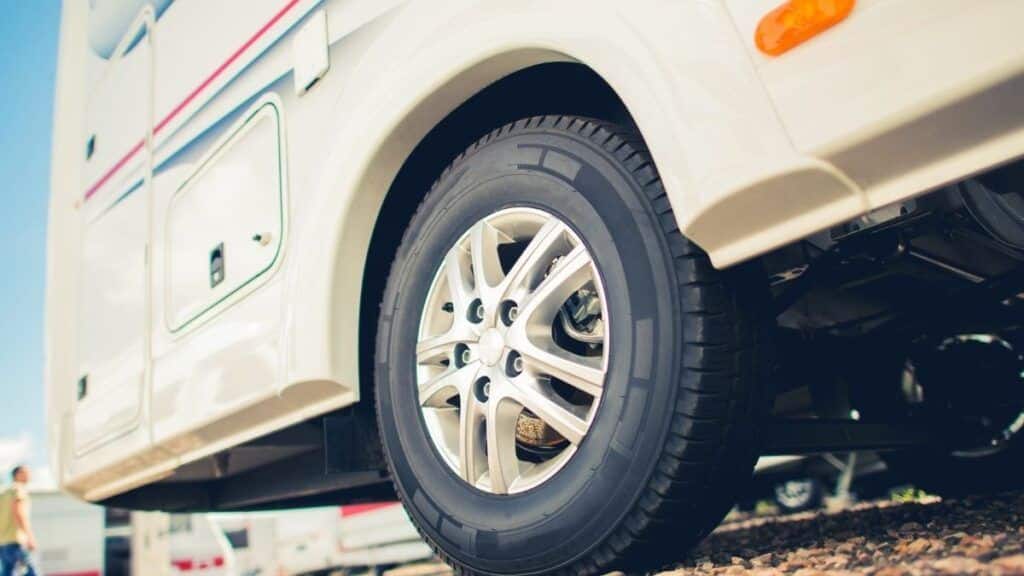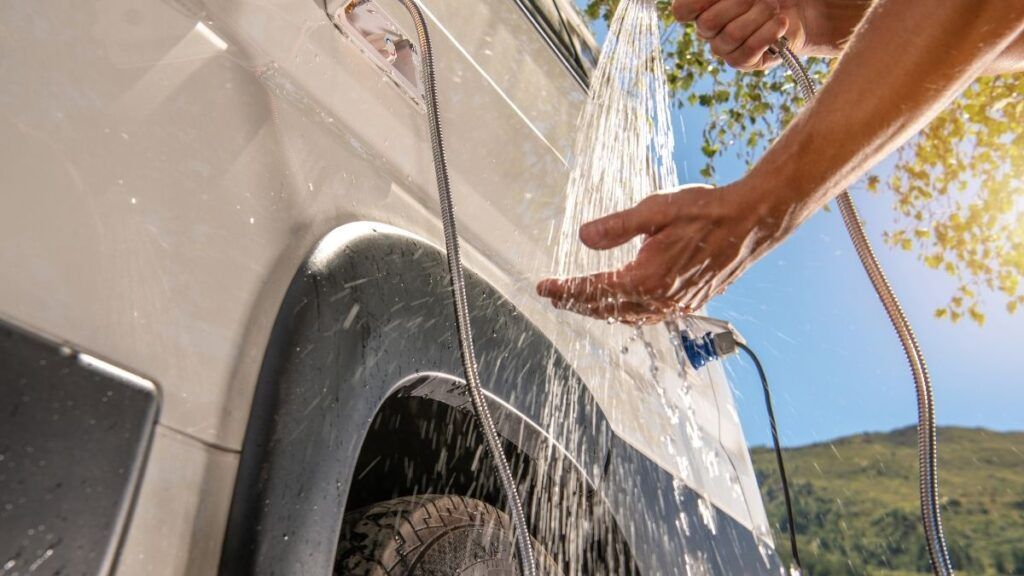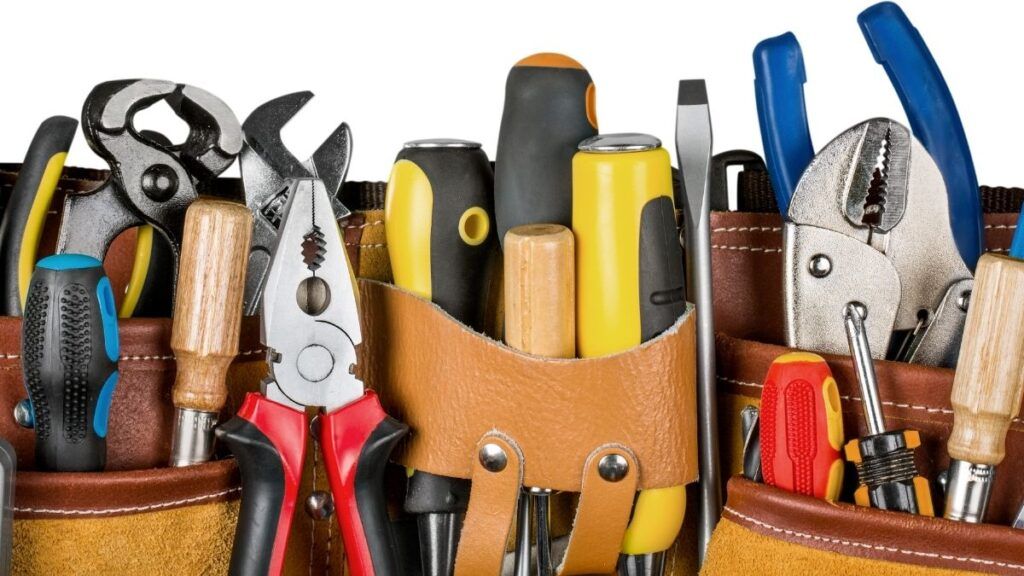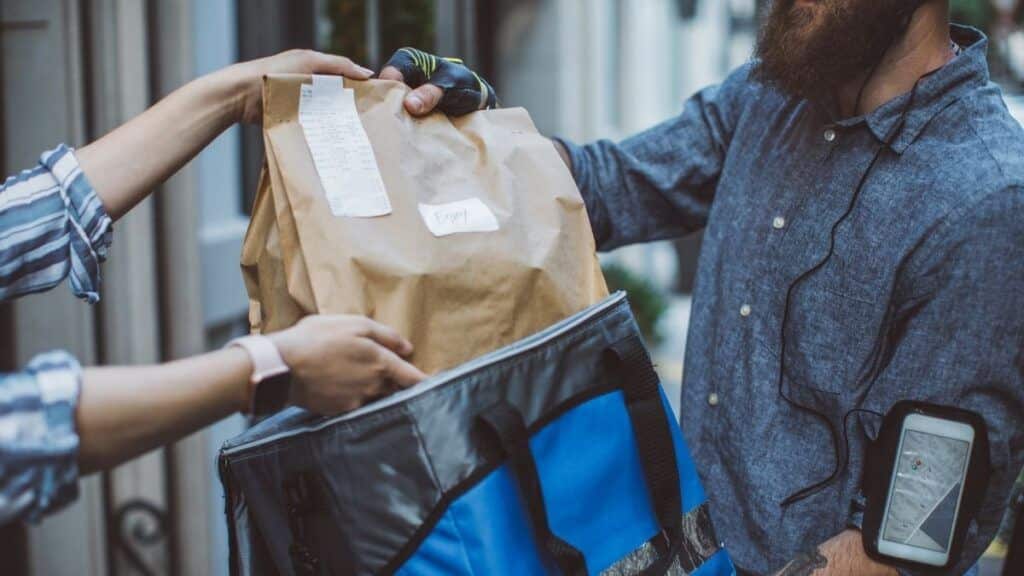Oh No! Is Your RV Too Heavy? (9 Weight-Reducing Tips)

RV too heavy? Here are 9 big and small ways to reduce the weight in your RV…
If your RV is too heavy, it can lead to some major consequences. Not only will it handle differently, but it can pose a safety risk.
A too-heavy RV can also cause more wear and tear on your rig and chew up your fuel efficiency.
But don’t worry! If you find that you need to shed some weight, there are a few easy swap outs you can do to keep your rig running smoothly!
RV Too Heavy? Dangers of an Overweight RV

RVs are designed to carry a specific amount of weight (GVWR). It varies from RV to RV, depending on the vehicle's size and design.
Just like a human body, when an RV gets weighed down too much, components can get worn out and start to break down.
When an RV becomes overloaded, it places undue stress on a number of RV components. They include the axles, tires, frame, as well as others.
In addition, when an RV is overweight it can become unbalanced, increasing the chances of losing control of the vehicle when trying to avoid a road hazard. The result can be catastrophic, damaging your RV beyond repair or, worse, hurting or killing someone.
Other effects from overloading an RV can include:
- Extreme tire wear and tear
- Tire failures
- Poor handling
- Driver fatigue
- Issues with the suspension
- Breakdowns
- Hard to control swaying
- Reduced stopping distance or capability
9 Weight-Reducing Tips for Your RV
The good news is, there are many ways to reduce the weight of your RV. The following outlines specific options to lighten your heavy load. In case you don’t know already, here is where and how to weigh your RV.
1. Replace Old, Heavy Furniture
Many older RVs have outdated furniture that is quite heavy. That is because many RVs have furniture made from solid wood frames. And wood is, well, heavy!
Consider replacing that furniture with lighter pieces. Yes, it can be a bit of a pain. But it will significantly reduce the weight of your RV.
Consider taking out couches or recliners and replacing them with aluminum or other lightweight metal frame alternatives.
Maybe you need some renovation tips?
There are many resources for DIYers to renovate their RVs to lighten the load. RV Today is one source.
2. Remove Unused Exterior Components
Is there anything attached to the exterior of your RV that you do not use?
Things like bike racks, satellite antennas, ladders, broken awning, air conditioner unit, and roof racks are some examples of things that may no longer get used. We simply forget about them because they’re out of sight, out of mind.
You can remove them to free up some of your extra weight.
3. Replace Your Heavy Mattress
RVs usually come with lightweight mattresses for this very reason. But, as we all know, they’re not very comfortable.
Some of us overcorrect by getting a big bulky mattress. Sure it’s comfy, but it can really weigh down your RV. So, try to find a happy medium between comfort and weight. In many cases, lighter can still be just as comfy.
Here’s How to Replace the Mattress in Your RV or Camper.
4. Reduce Your Water

Water is quite heavy! It is also one of those things that fly under the radar and get overlooked when it comes to weight on your RV.
If you can reduce the amount of water you carry in your tanks it can be a real weight reducer! If you plan on camping at a site that has water hookups, you can probably get away with only partially filling your tanks.
But water is a necessity. If you are boondocking, this is one place that you cannot bear to skimp on.
You know your camping habits best. But most people need about 4-5 gallons of water per day when boondocking. This can help guide you when deciding how much water to carry.
5. Replace Heavy Shelving
Another way to save on weight is to replace heavy shelving.
If your shelves are made of wood you should consider replacing them with a lighter material. They can still be functional, but help you save your RV from being overweight.
Consider replacing your organizational system with ones made from plastic that only weigh a fraction of wood.
6. Minimize Tools

It’s definitely hard to narrow down your RV toolkit, because you never know what you’ll face on the road. You don’t want to be out in the middle of nowhere without the tool you need.
But the problem is, tools are heavy.
I’ve found one of the best solutions is to pack multitools, like multi-bit screwdrivers and camping hammers. You get multiple tools in one.
Consider lightweight alternatives, too, like zip ties instead of rope or clamps.
You may want to check out 10 Tools Every RVer Needs to Carry to help you pack your toolbox.
7. Pack Only What is Needed
It’s so easy to overpack! Your mind starts reeling over all kinds of “what ifs” and before you know it, you’re overloaded.
Take stock in what you plan to bring with you on vacation, and ask yourself if you really need all of your items. If you do not need something for this particular trip, leave it at home.
One helpful tip is to make a packing list and list each item in specific categories. If you keep winter jackets onboard your RV, but are visiting Florida in June, you can leave those coats at home.
The same goes for cookware. Do you plan to cook a lot this trip or are you staying at a resort with a restaurant? Be honest about what meals you plan to make so that you can leave extra cookware behind.
To calm your nerves, remind yourself that you can always buy something if the need unexpectedly arises.
8. Use Online Delivery

Another easy way to save weight on your RV is to take advantage of online delivery services. You can have groceries and non-food items delivered right to your campsite!
Forget hauling dinner for two weeks with you across three states. Bring only what you need for a day or two and get the other stuff delivered.
Many services will deliver food for free if you purchase over a certain limit.
Or, if getting items delivered is not something you want to do, you can still limit the food you carry. Then visit the grocery store once you are settled where you're going.
9. Go Solar
I love the solar panels and they’re lightweight compared to a generator. And I can take them and use them without fussing with gas.
Generators are heavy, not to mention the gas needed to power them. By switching to solar panels you can save yourself weight and money. It is a win, win!
Solar panels are also a renewable energy source, which can help keep our environment healthy for a long time to come.
Was Your RV Too Heavy?
Have you had to figure out how to lighten your load? Please share your experience and advice in the comments below.
Mike and Jennifer's Great Lakes Shoreline Tour (U.S. Side)

Instead of the usual 7 Days that some of our other guides can be done in, with this one, we’re suggesting that you budget more time. This is why we are calling it a “Tour” instead of a 7-Day Guide! There are 86 pages in this new ebook.
In this new Great Lakes Shoreline Tour we cover in detail:
- Notable U.S. Cities/Towns along each Great Lake (US side) like Watertown, Grand Island, Geneva-on-the-Lake, Vermillion, Mackinaw City, and so many more!
- What to See/Do Around EACH Lake: Ocqueoc Falls Scenic Site, Les Cheneaux Islands, Antique Boat Museum, and many, many more places, including BONUS side trips!
- And good Campgrounds for each Lake (US side) – at least 4 or 5 for EACH Lake! With all the info you need to set up reservations.

I want to remove the stove/oven and water heater from our camper. Can I also remove the propane tank/equipment? Is there anything else that uses propane?
HI Kristin – this would be a great question for our RVLifestyle community. It is an online group of friendly RVers, and great resource. You can access it here: https://community.rvlifestyle.com/
– Team RV Lifestyle
Swapping a generator for solar panels only works if air conditioning is not in the picture. Even if the rig has a large battery bank and an inverter capable of running the AC, you can’t carry or deploy enough solar panels to recharge the batteries in a timely manner.
Regarding batteries, however, there is another place to save weight if you have a deep wallet – install LiFePO4 batteries. They are expensive, but weigh much less than SLA/AMG batteries, and the same capacity can be achieved with fewer batteries due to the deep discharging ability of the LiFePO4. A changeout of the converter/charger will probably be necessary also, as a different charging profile is required to fully charge them.
Thank you so much for all this helpful information. We really appreciate it! Team RV Lifestyle
How do I insulate the floor without adding weight? I prefer taking my own drinking water for people and our dogs but fill our big fresh water tank at destinations and try to empty our black and gray water regularly. Don’t know what else to do.